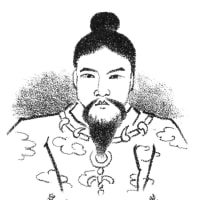『古事記』垂仁天皇 7
爾其后、豫知其情、悉剃其髮、以髮覆其頭、亦腐玉緖、三重纒手、且以酒腐御衣、如全衣服。如此設備而、抱其御子、刺出城外。爾其力士等、取其御子、卽握其御祖。爾握其御髮者、御髮自落、握其御手者、玉緖且絶、握其御衣者、御衣便破。是以、取獲其御子、不得其御祖。故、其軍士等、還來奏言「御髮自落、御衣易破、亦所纒御手玉緖便絶。故、不獲御祖、取得御子。」爾天皇悔恨而惡作玉人等、皆奪其地、故諺曰「不得地玉作也」。
≪英訳≫
Having already understood the Emperor’s intentions, the Empress completely shaved her hair and covered her head with it, and soaked a string of jewels until it decayed, tied it in triple knots around her hand, and spoiled her clothes with alcohol to make them appear as complete garments.
With these preparations, she carried the child and went outside the castle. The wrestlers tried to take the child, and even tried to take the Empress, but when they tried to seize her hair, it fell out; when they grabbed her hand, the string of jewels broke; and when they held her clothes, they tore apart. They were able to take the child, but they couldn’t take the Empress. The soldiers returned and reported, ‘Her hair fell naturally, the string of jewels broke easily, and her clothes tore apart while she had been wearing them. That’s why we couldn’t take the Empress. We have brought the child.’ Hearing this, the Emperor was deeply disappointed and held a grudge against the craftsmen who made the jewels, and he confiscated all their lands. Hence the proverb, ‘Inept jewelers who couldn’t hold their place.’
≪この英文の和訳≫
天皇の御心をあらかじめ理解した皇后は、丁寧に髪をすべて剃り落とし、その髪で頭を覆い、玉の緒を腐らせて三重に結びました。また酒でお召物を腐らせて、完全なお召物のようにして着ておいでになりました。
このように準備をして、御子を抱いて城の外に出られました。そこで力士たちが御子を取ろうとし、また皇后を取ろうとしましたが、御髪をつかんでも抜け落ちてしまい、玉の緒を握っても切れてしまい、お召し物をつかんでも破れてしまいました。このようにして御子は取れましたが、皇后を取ることはできませんでした。兵士たちが戻ってきて申し上げたのは「皇后さまの御髪が自然に落ち、玉の緒が簡単に切れ、お召し物を纏っておいでになっていたのにもかかわらず、取ることができませんでした。御子は無事に取りました」とのことでした。天皇は非常に残念がり、玉を作った職人たちに対してお怒りになり、彼らの領地を全て没収されました。それが「所を得ない玉作り」という諺(ことわざ)の由来です。
令和5年7月22日(土) 2023













